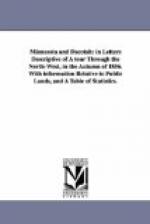The middle and northern part comprises an elevated plain, of average fertility and tolerably wooded. Towards the south it is characterized by bold undulations. The valley of the Missouri is narrow; and the bluffs which border upon it are abrupt and high. The country is adapted to agricultural pursuits, and though inferior as a general thing to much of Minnesota, affords promise of thrift and properity in its future. It is blessed with a salubrious climate. Dr. Suckley, who accompanied the expedition of Gov. Stevens through that part of the West, as far as Puget Sound, says in his official report: “On reviewing the whole route, the unequalled and unparalleled good health of the command during a march of over eighteen hundred miles appears remarkable; especially when we consider the hardships and exposures necessarily incident to such a trip. Not a case of ague or fever occurred. Such a state of health could only be accounted for by the great salubrity of the countries passed through, and their freedom from malarious or other endemic disease.”
Governor Stevens has some comprehensive remarks concerning that part of the country in his report. “The Grand Plateau of the Bois des Sioux and the Mouse River valley are the two keys of railroad communication from the Mississippi River westward through the territory of Minnesota. The Bois des Sioux is a river believed to be navigable for steamers of light draught, flowing northward from Lake Traverse into the Red River of the North, and the plateau of the Bois des Sioux may be considered as extending from south of Lake Traverse to the south bend of the Red River, and from the Rabbit River, some thirty miles east of the Bois des Sioux River, to the Dead Colt hillock. This plateau separates the rivers flowing into Hudson’s Bay from those flowing into the Mississippi River. The Mouse River valley, in the western portion of Minnesota, is from ten to twenty miles broad; is separated from the Missouri River by the Coteau du Missouri, some six hundred feet high, and it is about the same level as the parallel valley of the Missouri.” (Report, ch. 4.)
M. Nicollet was a scientific or matter of fact man, who preferred to talk about “erratic blocks” and “cretaceous formations” rather than to indulge in poetic descriptions. The outline which follows, however, of the western part of the territory is what he considers “a faint description of this beautiful country.” “The basin of the Upper Mississippi is separated in a great part of its extent from that of the Missouri, by an elevated plain; the appearance of which, seen from the valley of the St. Peter’s or that of the Jacques, looming as it were a distant shore, has suggested for it the name of Coteau des Prairies. Its more appropriate designation would be that of plateau, which means something more than is conveyed to the mind by the expression, a plain. Its northern extremity is in latitude 46 degrees, extending to 43 degrees; after




